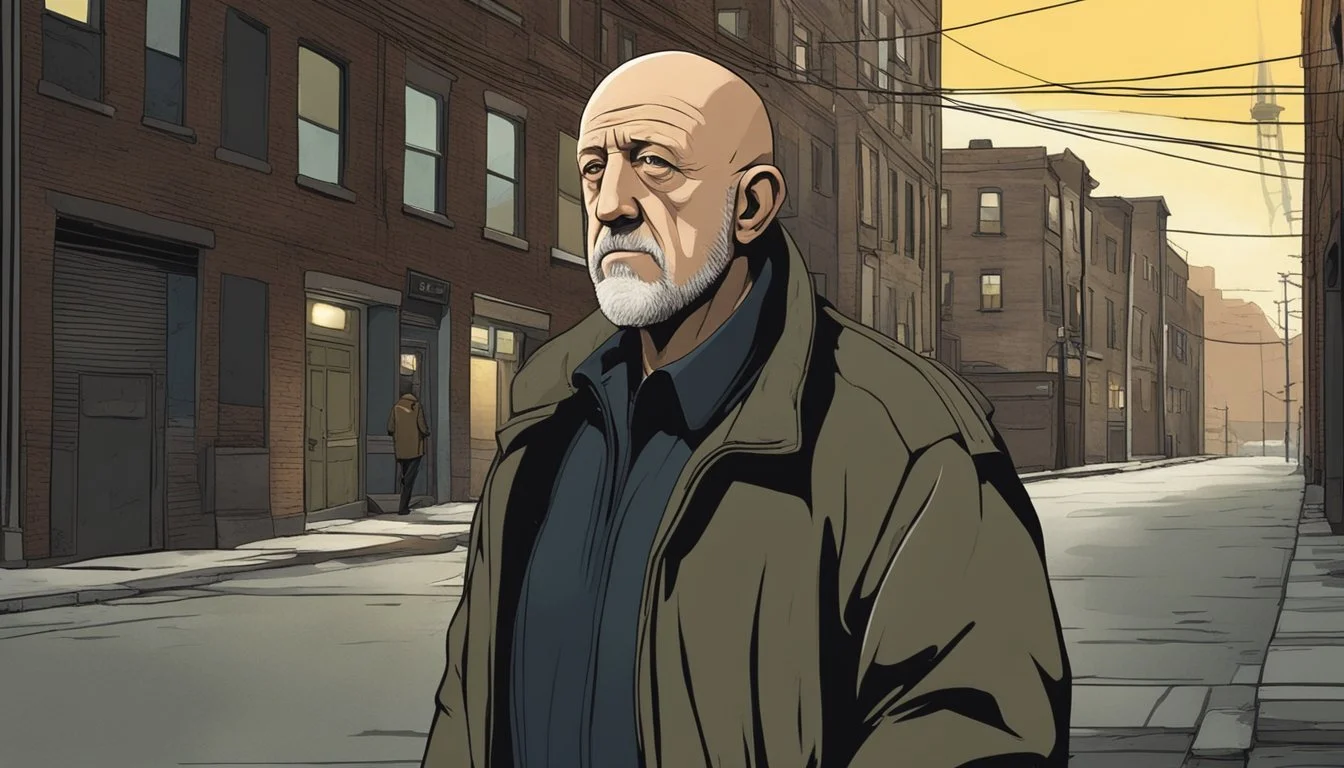Mike Ehrmantraut: The Philosophy of a World-Weary Hitman in Breaking Bad
A Deep Dive into His Pragmatic Worldview
Mike Ehrmantraut stands as one of the most intriguing characters in the Breaking Bad universe. A former Philadelphia police officer turned criminal enforcer, Mike's journey through the underworld of Albuquerque is marked by a distinctive philosophical outlook.
Mike's stoic approach to life and death reflects a deep-rooted pragmatism that guides his actions throughout the series. His calm demeanor and calculated decision-making set him apart from the more impulsive characters he encounters. Mike's world-weary perspective is shaped by years of experience on both sides of the law, giving him a unique insight into the moral complexities of the criminal world.
As a hitman and fixer for Gus Fring, Mike navigates treacherous waters with a code of ethics that, while unconventional, remains consistent. His loyalty to family, particularly his granddaughter Kaylee, drives many of his choices and adds layers of depth to his character. Through Mike, viewers are invited to explore questions of morality, loyalty, and the consequences of one's actions in a morally ambiguous landscape.
Character Background and Development
Mike Ehrmantraut's journey from law enforcement to the criminal underworld showcases a complex character evolution. His experiences shape him into a stoic, pragmatic figure in the Breaking Bad universe.
From Philadelphia Police Officer to Hitman
Mike Ehrmantraut began his career as a Philadelphia police officer. His time on the force exposed him to corruption and moral compromises. This experience left him disillusioned with the justice system. After leaving the police, Mike turned to less legal pursuits. He became a skilled hitman and fixer, known for his methodical approach and calm demeanor.
Mike's transition reflects his adaptability and willingness to operate in gray areas. His law enforcement background provides him with valuable skills and insights in his new criminal career.
Marine Corps Veteran to Meth Business Enforcer
Before his police career, Mike served in the United States Marine Corps. His military training instilled discipline and tactical expertise. These skills prove crucial in his role as an enforcer in the meth business.
Mike's military and police background make him a formidable asset to drug lord Gus Fring. He applies his strategic thinking and combat skills to protect Fring's operation. Mike's effectiveness stems from his ability to anticipate threats and neutralize them efficiently.
Mike Ehrmantraut as a Supporting Character in 'Breaking Bad' and 'Better Call Saul'
Mike, portrayed by Jonathan Banks, first appears in Breaking Bad's second season. He quickly becomes a fan favorite due to his no-nonsense attitude and dry wit. Vince Gilligan and the writers expand Mike's role, recognizing the character's potential.
In Better Call Saul, Mike's backstory is further explored. The prequel series delves into his motivations and the events that shaped him. Viewers witness his gradual descent into the criminal world, adding depth to his Breaking Bad persona.
Mike's relationships with other characters, particularly Jimmy McGill/Saul Goodman and Nacho Varga, reveal different facets of his personality. These interactions highlight his role as a reluctant mentor and his complex moral code.
Moral Code and Professional Ethics
Mike Ehrmantraut operates within a complex ethical framework, balancing pragmatism and loyalty with a deep-seated sense of justice. His actions are driven by past experiences and a commitment to providing for his family.
Pragmatism and Loyalty in the Criminal Underworld
Mike's approach to crime is methodical and pragmatic. He values efficiency and minimizes unnecessary violence. His loyalty to employers like Gus Fring is unwavering, but not blind.
Mike adheres to a strict code of professionalism. He completes jobs without fanfare and avoids loose ends. This pragmatism extends to his interactions with others in the criminal world.
He respects competence and despises recklessness. Mike's loyalty is earned through reliability and mutual respect. He forms alliances cautiously, always prioritizing long-term stability over short-term gains.
The Impact of Guilt and Devotion to Family
Mike's past as a corrupt cop in Philadelphia haunts him. The loss of his son drives his actions in the present. His primary motivation is providing for his granddaughter Kaylee.
This devotion to family shapes Mike's moral decisions. He justifies his criminal activities as necessary for Kaylee's future. Mike's guilt over his son's death fuels his protective instincts.
He strives to keep his criminal life separate from his family. Mike maintains a gentle demeanor with Kaylee, shielding her from his dangerous world. This duality in his character highlights the complex nature of his ethics.
Confronting Police Corruption and Institutional Failure
Mike's experience with the Philadelphia Police Department colors his view of law enforcement. He sees systemic corruption as a betrayal of justice. This disillusionment informs his current path.
He operates outside the law but maintains a personal sense of right and wrong. Mike often takes on roles that mirror legitimate law enforcement, such as private investigator or security consultant.
His methods, while illegal, are aimed at achieving a form of justice. Mike targets those he deems deserving of punishment. He views his actions as necessary in a world where official channels have failed.
Key Relationships and Alliances
Mike Ehrmantraut's complex web of alliances and adversaries shaped his journey through the criminal underworld. His strategic partnerships and tense rivalries highlighted his skills as an enforcer and his unwavering loyalty.
The Mike and Gus Fring Partnership
Mike's alliance with Gus Fring formed the cornerstone of his criminal career. Gus valued Mike's tactical expertise and unwavering loyalty. Their partnership was built on mutual respect and a shared methodical approach to the drug trade.
Mike served as Gus's right-hand man, overseeing security operations and handling sensitive tasks. He managed the logistics of Gus's meth distribution network with precision and discretion.
Their relationship extended beyond mere business, with Gus trusting Mike's judgment on crucial decisions. Mike's role as Gus's enforcer put him at odds with rival organizations, particularly the Salamanca family.
Interactions with Walter White and Jesse Pinkman
Mike's encounters with Walter White and Jesse Pinkman were marked by caution and conflict. He initially viewed them as liabilities to Gus's operation. Mike's pragmatism clashed with Walter's ego-driven ambitions.
Despite his reservations, Mike developed a begrudging respect for Jesse's loyalty and potential. He took on a mentorship role, teaching Jesse aspects of the criminal trade.
Mike's interactions with Walter remained tense. He recognized Walter's intelligence but distrusted his unpredictable nature. Their relationship deteriorated as Walter's actions threatened the stability of Gus's empire.
The Role of the Cartel and Conflicts with Hector Salamanca
Mike's position in Gus's organization put him in direct conflict with the Mexican drug cartel. He played a key role in Gus's long-term strategy to undermine cartel operations.
Hector Salamanca emerged as Mike's primary antagonist within the cartel hierarchy. Their feud was deeply personal, rooted in a violent history. Mike's calculated moves against Hector demonstrated his strategic thinking and patience.
Mike's expertise was crucial in navigating cartel politics and territory disputes. He orchestrated several covert operations to weaken the cartel's influence in Albuquerque. These actions solidified his importance to Gus while intensifying the danger he faced from cartel retaliation.
Career and Criminal Operations
Mike Ehrmantraut's criminal career was defined by his calculated approach and diverse skill set. He seamlessly transitioned between roles as a cleaner, private investigator, and drug empire manager.
A Career as a Cleaner and Private Investigator
Mike's expertise in cleaning up crime scenes made him invaluable to the criminal underworld. He meticulously removed evidence, disposed of bodies, and ensured no traces were left behind.
As a private investigator, Mike utilized his police background to gather intel and track targets. His observational skills and ability to remain undetected were crucial assets.
Mike's services extended to Saul Goodman's legal practice, where he conducted surveillance and gathered compromising information on various individuals.
Tactics: From Stealth to Brutal Force
Mike's preferred method was stealth. He often used non-lethal takedowns and precise planning to accomplish objectives without drawing attention.
When necessary, Mike employed brutal force with clinical efficiency. His combat skills, honed during his time as a Marine, made him a formidable opponent.
Mike's tactical acumen allowed him to anticipate threats and neutralize them before they escalated. He rarely underestimated his adversaries, always preparing for worst-case scenarios.
Managing Gus' Drug Empire and Los Pollos Hermanos
As Gus Fring's right-hand man, Mike oversaw security for the drug empire and Los Pollos Hermanos. He vetted employees, managed distribution routes, and eliminated threats to the operation.
Mike's role included coordinating with cartel members, supervising lab operations, and ensuring the smooth flow of product and money.
His attention to detail and pragmatic approach were instrumental in maintaining the facade of Los Pollos Hermanos while running a sophisticated meth business beneath the surface.
Mike's Influence on Others
Mike Ehrmantraut's wisdom and experience profoundly impacted those around him in the criminal underworld. His no-nonsense approach and practical advice shaped the trajectories of two key figures in particular.
Teaching and Protecting Jesse Pinkman
Mike took Jesse under his wing, imparting crucial lessons about survival in the drug trade. He taught Jesse to be more cautious and strategic, helping him evolve from a reckless addict to a capable operator.
Mike's protection extended beyond physical safety. He shielded Jesse from unnecessary violence and guided him through ethical dilemmas. Their relationship grew from reluctant partners to a mentor-protégé dynamic.
Jesse learned the value of patience and planning from Mike. This was evident in Jesse's improved decision-making and increased confidence in high-pressure situations.
Support and Guidance to Saul Goodman
Mike's influence on Saul Goodman (Jimmy McGill) was more subtle but equally significant. As Saul navigated the dangerous waters of representing drug dealers, Mike became his go-to problem solver.
Mike's pragmatism tempered Saul's tendency for flashy schemes. He provided a reality check when Saul's plans risked exposure or retaliation from rival criminals.
Their professional relationship evolved into a grudging respect. Mike's straightforward approach complemented Saul's legal maneuvering, creating a formidable team in crisis management.
Mike's guidance helped shape Saul's transformation from a small-time con artist into the "criminal lawyer" known to the Albuquerque underworld.
Portrayal and Reception
Mike Ehrmantraut's character in Breaking Bad and Better Call Saul left an indelible mark on television. His portrayal garnered critical acclaim and numerous award nominations.
Jonathan Banks' Performance and Award Nominations
Jonathan Banks brought Mike Ehrmantraut to life with a nuanced and compelling performance. His stoic demeanor and world-weary attitude resonated with audiences, earning him widespread recognition.
Banks received five Primetime Emmy nominations for his role as Mike. He was nominated for Outstanding Supporting Actor in a Drama Series for Breaking Bad in 2013 and for Better Call Saul in 2015, 2016, 2017, and 2019.
The actor's portrayal of Mike also earned him two Critics' Choice Television Award nominations for Best Supporting Actor in a Drama Series in 2015 and 2016.
Critical Analysis of the Role and Impact in the Series
Critics praised Mike Ehrmantraut as a complex and morally ambiguous character. His addition to the Breaking Bad universe added depth and intrigue to the storylines.
Mike's background as a former police officer turned criminal enforcer provided a unique perspective on the drug trade and its consequences. His pragmatic approach and loyalty to his employers made him a fascinating counterpoint to other characters.
Analysts noted how Mike's presence elevated tension in key scenes. His calm demeanor often masked lethal intent, creating suspense and unpredictability in the narrative.
Mike's relationship with his granddaughter Kaylee added emotional depth to his character. This softer side contrasted with his ruthless professional persona, making him more relatable to viewers.
Cultural and Societal Reflections
Mike Ehrmantraut's character illuminates complex societal issues and cultural attitudes. His portrayal offers insights into violence, morality, aging, and power dynamics in contemporary America.
Depiction of Violence and Moral Ambiguity in American TV
Breaking Bad pushes boundaries in its portrayal of violence and moral ambiguity. Mike's calculated approach to violence reflects a desensitized view of brutality in the criminal underworld. His actions often blur the line between right and wrong, challenging viewers' ethical standards.
The show depicts the harsh realities of the drug trade, with meth at its center. Mike's involvement exposes the far-reaching impact of drug trafficking on society. His past as a Vietnam War veteran adds depth to his character, hinting at the lasting effects of conflict on individuals and communities.
The Representation of Age, Experience, and Ego
Mike stands out as an older, experienced figure in a world often dominated by younger characters. His age is portrayed as an asset, with wisdom gained from years in law enforcement and the criminal sphere. This representation challenges societal perceptions of aging and capability.
His interactions with characters like Skyler and Marie Schrader highlight generational differences in handling crisis and moral dilemmas. Mike's no-nonsense attitude contrasts sharply with the ego-driven decisions of younger characters, offering a critique of impulsiveness and short-term thinking.
The character's struggle with depression and past trauma adds nuance to his portrayal, breaking stereotypes about masculinity and emotional expression in older men.
Legacy and Continued Influence
Mike Ehrmantraut's impact on the Breaking Bad universe extends far beyond his on-screen appearances. His character resonated deeply with audiences, leaving an indelible mark on popular culture.
In Albuquerque, New Mexico, Mike's presence lingers through the criminal underworld he once navigated. His methodical approach to crime and unwavering loyalty set a new standard for fictional antiheroes.
Mike's relationship with his granddaughter Kaylee humanized him, adding depth to his character. This dynamic highlighted the complexities of balancing family life with a criminal career.
The character's influence can be seen in subsequent crime dramas, inspiring writers to create more nuanced and morally ambiguous figures. Mike's pragmatic worldview and stoic demeanor have become a template for similar characters.
His legacy also lives on through fan discussions, academic analyses, and popular media references. Mike's memorable quotes and life philosophies continue to be shared and debated by viewers.
In the broader context of television history, Mike Ehrmantraut stands as a testament to the power of well-crafted supporting characters. His role demonstrates how such figures can elevate and enrich storytelling.









